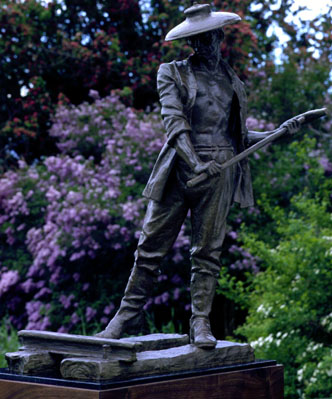|
|
|
BITTER STRENGTH
by Edward J. Fraughton
Price: $9,500
Status: Available
Size: 24 inches high
Edition: 50
Media: Cast Bronze
The United States of America was forever changed by the completion of the transcontinental railroad at Promontory Point, Utah, on May 10, 1869. Geographically, the railroad unified from ocean to ocean a nation recovering from the Civil War. The railroad allowed transcontinental travel from Omaha to San Francisco, which typically required 4 1/2 months overland prior to its construction, to be reduced to approximately one week.
This great achievement could scarcely have been accomplished without the Chinese laborer. During the 1860ís, as many as 15,000 laborers were imported from China to work on the Central Pacific line from San Francisco to Utah. Working their way through the California Sierras represented a superhuman achievement requiring long deep fills through passes, a complex system of wooden trestles, and countless miles of snow sheds to protect the trains and tracks from impenetrable snow falls and avalanches. Perhaps the most daunting task of the small-framed, but muscular oriental workers was the construction of 15 tunnels through solid granite mountains. Throughout the ordeal, the Chinese remained healthier than the Irish, Swedes, Italians, Greeks and other workers because they kept to themselves, boiled all their water for tea, and employed their own cooks to prepare meals from their own native food, to which they were accustomed.
Because of their great achievement, the Chinese were asked to lay the last rail to join east and west at the official Driving of the Golden Spike ceremony at Promontory. I was particularly honored to be selected to portray in sculpture this epic tale of the Chinese in the development of the American West.
Bitter Strength was commissioned for the Ogden Union Station Museum located in Ogden, Utah. Another casting in the series was purchased and is on display in the permanent collection of the California Library Association on the State Capitol grounds in Sacramento, California.
|
Copyright © 2006 Edward J. Fraughton All Rights
Reserved |



